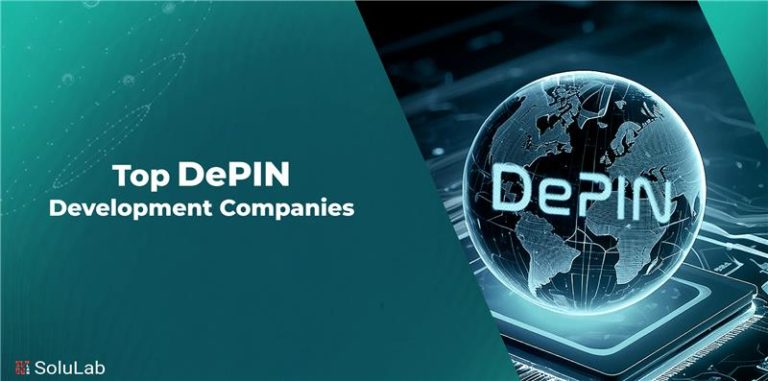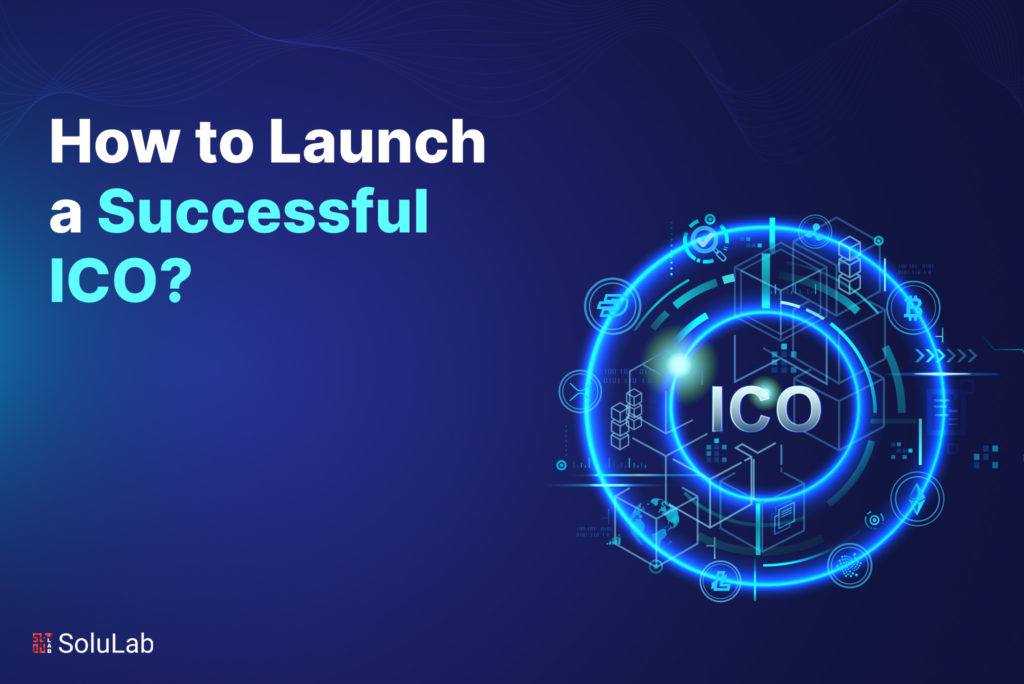
The world of cryptocurrency and blockchain technology has witnessed remarkable growth over the past decade. This exponential rise has not only attracted the attention of tech enthusiasts but has also given birth to a new form of fundraising called Initial Coin Offerings (ICOs). ICOs have become a popular means for blockchain projects to raise capital and fuel their development. However, launching a successful ICO is no small feat and requires careful planning, strategy, and compliance with regulations.
In this comprehensive guide, we will delve deep into the intricacies of launching a successful ICO. From understanding the fundamentals of ICOs to navigating the legal and marketing aspects, we will provide you with a roadmap to embark on your ICO journey. Whether you’re a blockchain startup looking to fund your project or an investor considering participating in an ICO, this guide will equip you with the knowledge and insights needed to make informed decisions and maximize your chances of success.
Understanding ICOs
Initial Coin Offerings (ICOs) have emerged as a groundbreaking fundraising method in the realm of blockchain and cryptocurrency. An ICO allows blockchain startups and projects to raise capital by offering digital tokens to investors in exchange for cryptocurrencies like Bitcoin (BTC) or Ethereum (ETH). These tokens serve various purposes within the project’s ecosystem, from providing access to ico launch services to representing ownership shares.
What is an ICO?
Initial Coin Offerings (ICOs) represent a groundbreaking method of fundraising within the cryptocurrency and blockchain sphere. Essentially, an ICO is a fundraising mechanism that enables blockchain projects to acquire capital by issuing digital tokens to investors. In return, these investors provide established cryptocurrencies such as Bitcoin (BTC) or Ethereum (ETH). These tokens serve a multifaceted role within the project’s ecosystem, granting access to services and often symbolizing ownership shares.
The term “ICO” bears a resemblance to the traditional Initial Public Offering (IPO) in the financial world. However, there are crucial distinctions between the two. While an IPO involves the issuance of shares in a company to the public, an ICO issues tokens that can serve various purposes, from granting access to a platform’s features to enabling participation in a decentralized network’s governance.
History of ICOs
The history of ICOs is a testament to the rapid evolution of the blockchain and cryptocurrency landscape. The concept of ICOs took its first steps with the Mastercoin project in 2013, marking the inception of this innovative fundraising model. Mastercoin successfully raised over 4,700 Bitcoins (BTC), which at the time equated to millions of dollars in value. This inaugural ICO served as a trailblazer for future projects aiming to secure funds via token sales.
The real game-changer arrived in 2014 with Ethereum’s ICO. Ethereum, a blockchain platform designed for decentralized applications (dApps) and smart contracts, conducted an ICO that raised approximately $18 million. Ethereum’s successful funding campaign highlighted the potential of ICOs as a means to acquire substantial capital for blockchain development.
Read Our Blog: What are the Essential Things to Know for an ICO?
How Does an ICO Work?
The mechanics of an ICO involve several key components. First, a blockchain project is conceptualized, and its development team creates a whitepaper outlining the project’s goals, technical details, and tokenomics. The project’s team and advisors play a crucial role in gaining investor trust.
Once the whitepaper is ready, the project conducts a marketing campaign to generate interest and awareness. Investors participate in the ICO by sending funds, typically in cryptocurrencies like Bitcoin (BTC) or Ethereum (ETH), to the project’s designated wallet address. In return, they receive the project’s native tokens at a predetermined rate. These tokens may represent ownership in the project, provide utility within the ecosystem, or both.
Benefits of ICOs
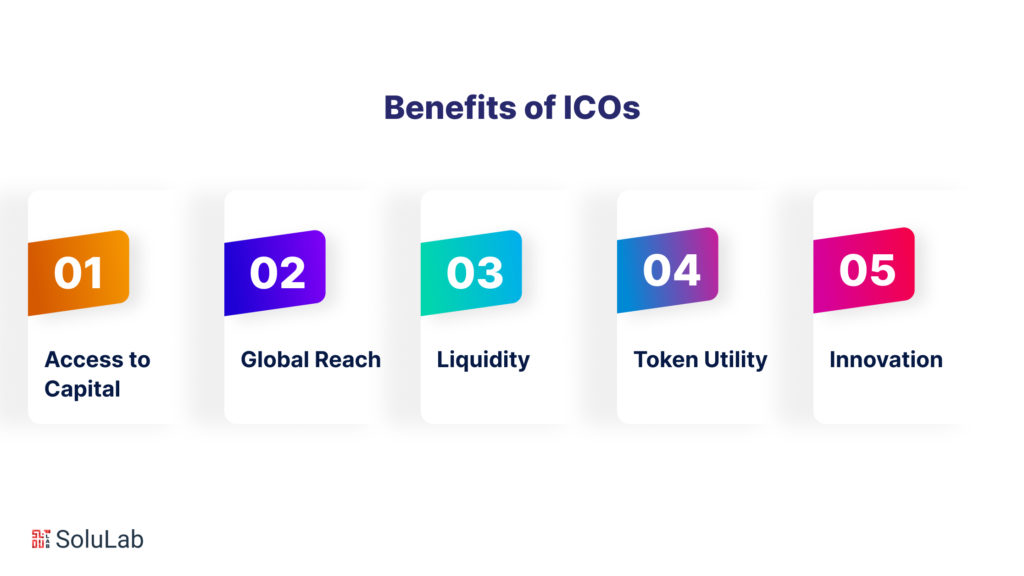
ICO participants are drawn to this fundraising model for several reasons:
- Access to Capital: For blockchain startups and entrepreneurs, ICOs provide a direct route to capital without the need for traditional venture capital or bank loans. This democratizes fundraising and opens up opportunities for projects around the world.
- Global Reach: ICOs can attract a global pool of investors, allowing projects to reach a diverse and geographically dispersed audience. This global reach can result in a more diverse and engaged user base.
- Liquidity: Tokens issued through ICOs often become tradeable on cryptocurrency exchanges shortly after the fundraising campaign. This liquidity provides investors with the ability to buy or sell tokens, enhancing market dynamics.
- Token Utility: ICO tokens typically serve a specific purpose within the project’s ecosystem. They can represent access to a platform’s features, ownership of digital assets, or voting rights. This utility adds intrinsic value to the tokens.
- Innovation: ICOs have fueled innovation in the blockchain space, giving rise to a multitude of projects exploring novel use cases, from decentralized finance (DeFi) and non-fungible tokens (NFTs) to supply chain management and more.
Read Also: 7 Most Successful ICOs of All Time
Risks of ICOs
However, ICOs also come with inherent risks:
- Regulatory Uncertainty: The regulatory environment surrounding ICOs varies by country and can change rapidly. This uncertainty poses legal and compliance risks for both project founders and investors.
- Fraud and Scams: The nascent nature of ICOs has made them susceptible to fraudulent schemes and scams. Investors must exercise caution and conduct thorough due diligence before participating in any ICO.
- Market Volatility: The cryptocurrency market is highly volatile, and the value of ICO tokens can fluctuate significantly shortly after listing on exchanges. This volatility can impact investor returns and confidence.
- Lack of Investor Protection: Unlike traditional financial markets, ICOs often lack the investor protections provided by regulatory agencies. Investors may have limited recourse in the event of disputes or project failures.
- Project Viability: Not all ICO projects are successful in delivering on their promises. Investors face the risk of backing projects that fail to achieve their objectives, resulting in loss of capital.
- Hype and Speculation: FOMO (Fear of Missing Out) and speculative behavior can drive up token prices during ICOs. This hype-driven environment can lead to irrational investment decisions.
In the following sections, we will explore the steps involved in launching a successful ICO, including the preparation phase, the actual ICO launch, post-ICO activities, legal considerations, and emerging trends in the ICO landscape.
Preparing for Your ICO
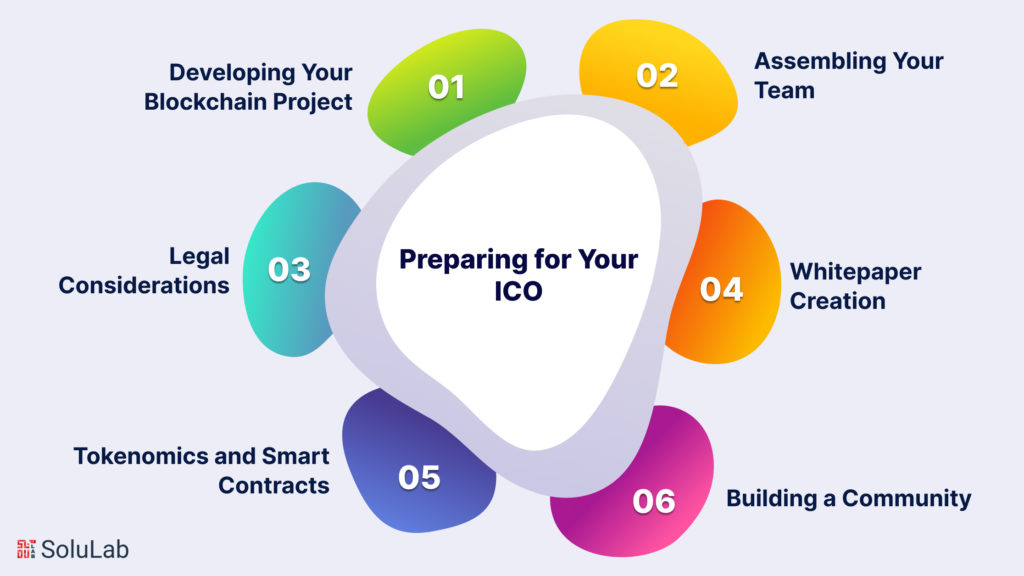
Before embarking on an ICO journey, meticulous preparation is essential. This phase involves developing your blockchain project, assembling a skilled team, addressing legal considerations, crafting a comprehensive whitepaper, designing tokenomics, and building a community of supporters.
-
Developing Your Blockchain Project
The foundation of a successful ICO lies in the development of a compelling blockchain project. This phase involves ideation, conceptualization, and technical planning to transform your vision into a tangible product or platform.
Developing your blockchain project is a foundational step that sets the stage for the rest of your ICO journey. A well-conceived and technically sound project is more likely to garner investor interest and support. Once your project reaches a certain level of maturity, you can proceed to the next steps in preparing for your ICO.
-
Assembling Your Team
Building a capable and dedicated team is pivotal to the success of your ICO and blockchain project. The individuals you bring on board should possess the expertise and experience needed to navigate the complexities of blockchain technology, finance, marketing, and legal compliance.
Assembling a well-rounded team with the right mix of skills and expertise is a critical step in preparing for your ICO. Each team member should be aligned with your project’s vision and dedicated to its success. With a strong team in place, you can tackle the multifaceted challenges in the launch of your ICO.
Check Our Blog Post: Top 6 ICO Platforms You Can Trust
-
Legal Considerations
Navigating the legal landscape is essential to avoid regulatory issues in your launch ICO journey. Legal considerations may include the incorporation of your project, compliance with securities regulations, and Know Your Customer (KYC) and Anti-Money Laundering (AML) procedures. Consult with legal experts who specialize in cryptocurrency and blockchain to ensure compliance with local and international laws.
Navigating the legal landscape is essential to the success of your launch ICO. Legal considerations encompass a wide range of factors, from the structure of your token sale to regulatory compliance.
-
Whitepaper Creation
A well-crafted whitepaper is the cornerstone of your launch ICO. It should provide a comprehensive overview of your project, including its objectives, technical details, tokenomics, use cases, and roadmap. A clear and transparent whitepaper builds trust with potential investors. Ensure that it addresses the “why” and “how” of your project, explaining its value proposition and how it aims to solve real-world problems.
A well-structured and informative whitepaper can instill confidence in potential investors and help them make informed decisions. It serves as a foundational document that aligns stakeholders with your project’s vision and objectives.
Read Our Blog Post: ICO vs. STO: What’s the Difference?
-
Tokenomics and Smart Contracts
Tokenomics refers to the economics of your project’s token ecosystem. It encompasses various aspects related to the creation, distribution, and utility of tokens within your project. Designing a robust tokenomics model is essential for the success of your ICO.
Creating a well-balanced tokenomics model requires a deep understanding of your project’s goals and user base. It should align with your whitepaper’s objectives and provide a clear value proposition for token holders. Moreover, smart contracts play a crucial role in implementing and automating the tokenomics rules you define.
-
Building a Community
Building a strong and engaged community is a fundamental aspect of preparing for a successful ICO. A supportive community not only provides initial backing but can also contribute to the long-term success of your project.
Building a community is an ongoing effort that requires dedication and active engagement. A vibrant community can become a powerful advocate for your project, attracting more participants and supporters as you move closer to your ICO launch.
Launching Your ICO
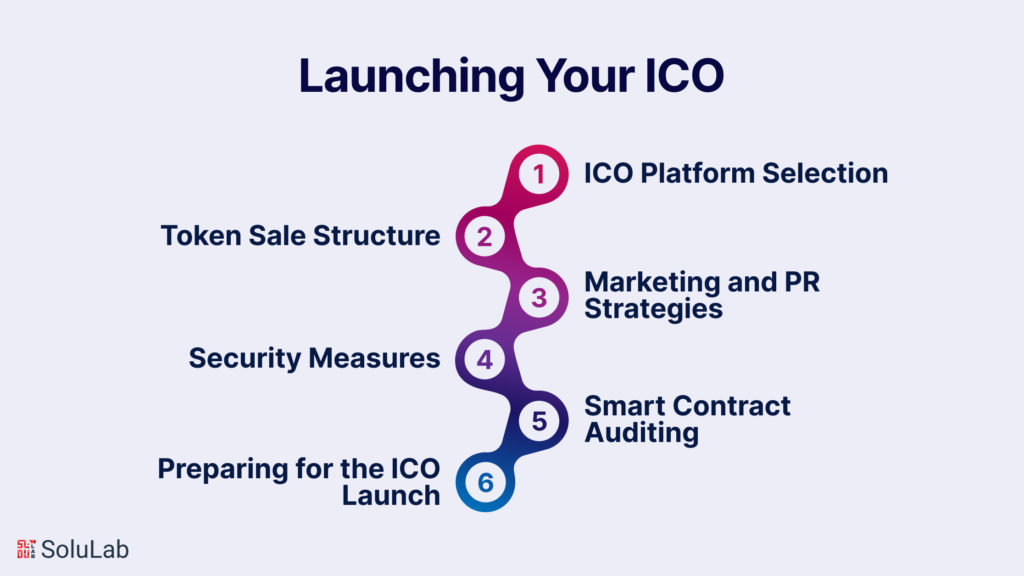
The ICO launch phase involves selecting the right platform, structuring your token sale, crafting marketing and public relations strategies, implementing security measures, conducting smart contract audits, and ensuring everything is in place for a smooth ICO launch.
-
ICO Platform Selection
Choosing the right platform to launch your ICO is a critical decision that impacts your fundraising success. The platform you select should align with your project’s goals, target audience, and technical requirements.
When selecting an ICO platform, assess factors such as transaction costs, network congestion, developer community, security features, and the platform’s track record with previous ICOs. Additionally, consider the preferences of your target audience, as some investors may have platform-specific preferences.
-
Token Sale Structure
The structure of your token sale plays a pivotal role in attracting investors and determining the success of your ICO. Different token sale structures cater to various objectives and investor profiles.
The choice of token sale structure should align with your project’s funding needs, timeline, and strategic goals. Additionally, transparently communicate the structure and terms to potential investors through your whitepaper and marketing materials.
Read Our Blog: What are Some of the Benefits of an ICO?
-
Marketing and PR Strategies
Effective marketing and public relations (PR) strategies are essential for creating awareness, generating interest, and building trust around your ICO. A well-planned marketing campaign can attract a diverse pool of investors.
Developing a comprehensive marketing and PR strategy requires a deep understanding of your target audience and their preferences. Tailor your approach to effectively communicate your project’s value proposition and engage potential investors.
-
Security Measures
Security is paramount throughout the ICO process to protect your project, team, and investors from potential threats and vulnerabilities. Implementing robust security measures can prevent security breaches and instill confidence in your community.
By prioritizing security at every stage of your ICO, you can create a safe and trustworthy environment for both contributors and your team. Transparency and proactive communication regarding security measures can also instill confidence in your community.
-
Smart Contract Auditing
Before launching your ICO, it’s essential to audit your smart contracts thoroughly. Smart contract audits help identify vulnerabilities or errors that could compromise the security of your token sale. Hiring reputable smart contract auditors or firms is a critical step in ensuring the integrity of your ICO.
Smart contract audits are a crucial component of ICO security. They help identify and mitigate vulnerabilities that could be exploited by malicious actors. Demonstrating a commitment to smart contract security can attract investors and foster confidence in your project.
Read Also: Top 10 ICO Development Companies
-
Preparing for the ICO Launch
As the launch date approaches, ensure that all systems are in place for a smooth ICO launch. Test your ICO platform, conduct mock token sales, and prepare customer support resources to address inquiries and issues. Make necessary arrangements to handle the high volume of transactions and participants expected during the ICO.
Preparing for the ICO launch requires meticulous attention to detail and a focus on both technical and logistical aspects. A well-executed launch sets the stage for a successful fundraising campaign.
Conducting Your ICO
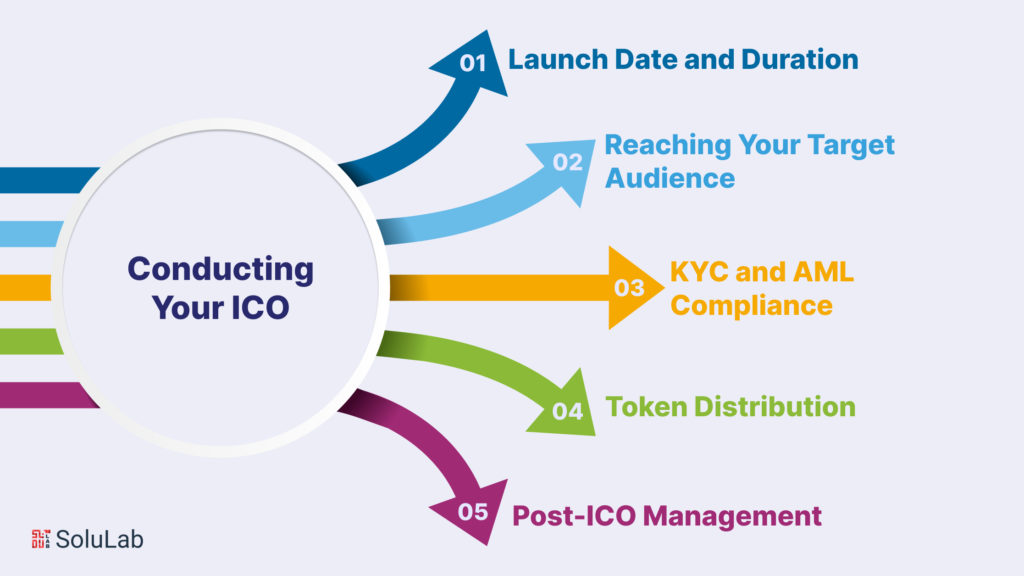
Once your ICO is launched, it’s crucial to manage various aspects, including the launch date and duration, reaching your target audience, KYC and AML compliance, token distribution, and post-ICO management.
-
Launch Date and Duration
Selecting the right launch date and duration for your launch ICO is strategic. Consider factors like market conditions, investor sentiment, and potential competition with other ICOs. Determine the duration of your ICO sale, which can vary from a few days to several weeks, and set a clear end date.
The timing of your ICO should align with your project’s goals and the broader market conditions. It’s important to strike a balance between creating urgency and allowing sufficient time for participation.
-
Reaching Your Target Audience
Effective communication with your target audience is key to a successful ICO. Continue engaging with your community and addressing questions and concerns. Leverage email marketing, social media, and advertising to reach a broader audience. Collaborate with influencers and crypto-related media outlets for additional exposure.
Building a strong and engaged community plays a pivotal role in reaching your target audience. Regularly update your community on project developments, milestones, and important announcements.
Read Our Blog: Which are the Best ICO Listing Websites Out There?
-
KYC and AML Compliance
Compliance with KYC and AML regulations is essential for ICOs to prevent fraudulent activities and money laundering. Implement robust KYC procedures to verify the identity of participants and conduct necessary due diligence. Partner with KYC service providers if needed to streamline the process.
KYC and AML compliance are critical for creating a transparent and secure ICO environment. Properly vetting contributors helps prevent fraudulent activity and promotes trust among investors. Know Your Customer (KYC) and Anti-Money Laundering (AML) compliance measures are essential to ensure the legitimacy of contributors and protect your project from potential legal issues.
-
Token Distribution
After the ICO concludes, distribute tokens to participants as per the terms outlined in your whitepaper and smart contracts. Ensure transparency in the distribution process and keep participants informed about the status of their token allocations. Be prepared to address inquiries and provide support during this phase.
Managing contributions effectively is crucial for maintaining trust and accountability. Clear communication and transparency regarding the management of funds are essential. Managing contributions and funds during your ICO requires careful planning and execution. Implementing secure and transparent procedures is essential to maintain trust with contributors.
-
Post-ICO Management
The post-ICO phase is crucial for project development and maintenance. Focus on delivering on your project’s promises, meeting roadmap milestones, and engaging with your community. Regular updates, transparency, and active communication with investors contribute to building trust and credibility.
Post-ICO activities are critical for delivering on your project’s promises, building trust, and ensuring the long-term success and sustainability of your blockchain venture.
Conclusion
In conclusion, the journey of launching an ICO that is successful is an intricate one that demands meticulous planning, rigorous execution, and unwavering dedication. As blockchain technology continues to evolve, ICOs remain a vital avenue for funding innovative projects and solutions. The significance of this fundraising mechanism lies not only in capital generation but also in creating opportunities for groundbreaking ideas to flourish.
Throughout this comprehensive guide, we have delved into the intricacies of ICOs, from their inception to the multifaceted process of preparation, launch, and post-ICO activities. We’ve explored the critical aspects of developing a blockchain project, assembling a proficient team, addressing legal considerations, crafting a compelling ico whitepaper, defining tokenomics, and nurturing a robust community.
Launch an ICO involves crucial decisions, such as selecting the right ICO platform, structuring the token sale, implementing marketing and security strategies, and ensuring compliance with Know Your Customer (KYC) and Anti-Money Laundering (AML) regulations. Additionally, post-ICO activities, including token distribution, exchange listings, community engagement, and project development, are instrumental in fulfilling your promises to investors and users alike.
As the ICO landscape evolves, adaptability and compliance with regulatory changes are paramount. The blockchain industry continues to witness innovations like Security Token Offerings (STOs) and the integration of Decentralized Finance (DeFi) into fundraising mechanisms, opening new horizons for blockchain entrepreneurs.
At SoluLab, we recognize the transformative potential of ICOs in the world of blockchain technology. As a leading provider of ICO development services and solutions, we are committed to guiding you through every phase of your ICO journey. Our expertise in white label ICO platform development and white label ICO exchange platforms enables you to raise the question of how to launch an ico with confidence, leveraging the latest technologies and best practices.
In the ever-evolving blockchain ecosystem, success in launching an ICO hinges on embracing innovation, fostering transparency, and engaging with your community effectively. Your ICO is not merely a financial endeavor; it’s an opportunity to create lasting value and make a meaningful impact. With the right approach, you can navigate the challenges, achieve your fundraising goals, and contribute to the ongoing evolution of blockchain technology. SoluLab is here to support you every step of the way.
FAQs
1. What is an ICO, and how does it differ from other fundraising methods?
An Initial Coin Offering (ICO) is a fundraising method that involves issuing digital tokens or coins to investors in exchange for capital. It differs from traditional fundraising methods, such as venture capital or initial public offerings (IPOs), as it leverages blockchain technology and offers tokens with specific utilities within a project or platform.
2. What are the key steps to launching a successful ICO?
Launching a successful ICO involves several key steps, including project development, assembling a team, addressing legal considerations, creating a whitepaper, defining tokenomics, choosing an ICO platform, implementing marketing strategies, and ensuring security measures.
3. What is a white label ICO platform, and why is it important?
A white label ICO platform is a pre-built, customizable solution that enables entrepreneurs to launch their ICOs without developing the entire platform from scratch. It saves time, reduces costs, and provides access to essential features and functionalities required for a successful ICO.
4. How can I ensure compliance with regulations during an ICO?
Compliance with Know Your Customer (KYC) and Anti-Money Laundering (AML) regulations is crucial during an ICO. Implementing robust KYC/AML processes, partnering with legal advisors, and staying informed about regulatory changes are essential steps to maintain compliance.
5. What are some common challenges faced during ICO launch?
Common challenges during an ICO launch include building investor trust, attracting a substantial user base, addressing security concerns, and adapting to evolving regulatory landscapes. Managing these challenges effectively is vital for a successful ICO.
6. Are there alternatives to ICOs for fundraising in the blockchain space?
Yes, there are alternatives like Security Token Offerings (STOs) and Initial Exchange Offerings (IEOs), each with its own set of rules and regulations. STOs, for example, involve tokens backed by real-world assets, providing additional security to investors.
7. How can SoluLab assist in launching a successful ICO?
SoluLab offers comprehensive ICO development services and solutions, including white label ICO platform development and white label ICO exchange platforms. With our expertise and guidance, you can navigate the complexities of ICOs, from planning to execution, to achieve a successful fundraising outcome.






